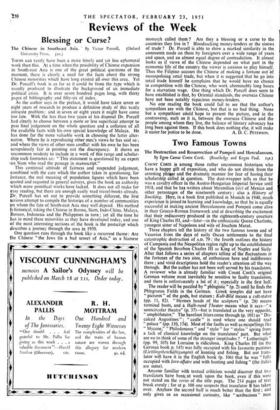Reviews of the Week
Blessing or Curse?
The Chinese in Southeast Asia. By Victor Purcell. (Oxford
University Press. sos.)
THERE can rarely have been a more timely and let less ephemeral work than this. At a time when the possibility of Chinese expansion in South-cast Asia is one of the great political questions of' the moment, there is clearly a need for the facts about the strong Chinese minorities which have long existed all over this area. Yet Dr. Purcell's book is as far as it could be from the type which is usually produced to illustrate the background of an immediate political crisis. It is over seven hundred pages long, with thirty pages of bibliography and fifty-six of index.
As the author says in the preface, it would have taken seven or eight years of research to produce a definitive study of this vastly intricate problem: and in seven or eight years it might have come too late. With the less than two years at his disposal Dr. Purcell had clearly to choose between a more or less superficial attempt to pass final judgement on the whole question and a collation of all the available facts with his own special knowledge of Malaya. He has done far the more valuable work in choosing the latter alter- native. Where he is reproducing other men's views he has said so ; and where the views of other men conflict with his own he has been scrupulously fair in pointing out the discrepancy. It shows an uncommon modesty to include in a work of this range and scholar- ship such footnotes as: " This statement is questioned by an expert • on Siam who read the passage in manuscript."
This continual attitude of fairness and suspended judgement, combined with the care which the author takes in questioning, for instance, the real meaning of population figures which have been quoted and requoted in general surveys, gives the book an authority which more pontifical works have lacked. It does not all make for easy reading, but there are enough easily read travel-books already. Dr. Purcell has set out to provide something different, the first serious attempt to compile the histories of a number of communities on whom the fate of South-east Asia may well depend. His method is historical, taking the Chinese in Burma, Siam, Indo-China, Malaya, Borneo, Indonesia and the Philippines in turn ; yet all the time he has in mind these minorities as they have developed today, and one of the most interesting sections of the book is the postscript which describes a journey through the area in 1950.
One question runs through the book like a recurrent theme: Are the Chinese " the Jews (in a bad sense) of Asia," as a Siamese
monarch called them ? Are they a blessing or a curse to the countries they live in ? Bloodsucking money-lenders or the sinews of trade ? Dr. Purcell is able to show a marked similarity in the comments made on them by foreigners over a wide range of years and space, and an almost equal degree of contradiction. It almost looks as if views of the Chinese depended on what part in the economic life of the country the viewer is anxious to play himself. Thus the Filipino accuses the Chinese of making a fortune out of monopolising retail trade, but when it is suggested that he go into retail trade himself he complains that he would have no chance in competition with the Chinese, who work abominably long hours for a starvation wage. One thing which Dr. Purcell does seem to have established is that, by Oriental standards, the overseas Chinese have not been notably rapacious money-lenders.
No one reading the book could fail to see that the author's sympathies are with the Chinese, but that is no bad thing. None but a sympathiser could hope to present the picture, and in the controversy, such as it is, between the overseas Chinese and the people among whom they live, the balance of literary advocacy has long been against them. If this book does nothing else, it will make






































 Previous page
Previous page